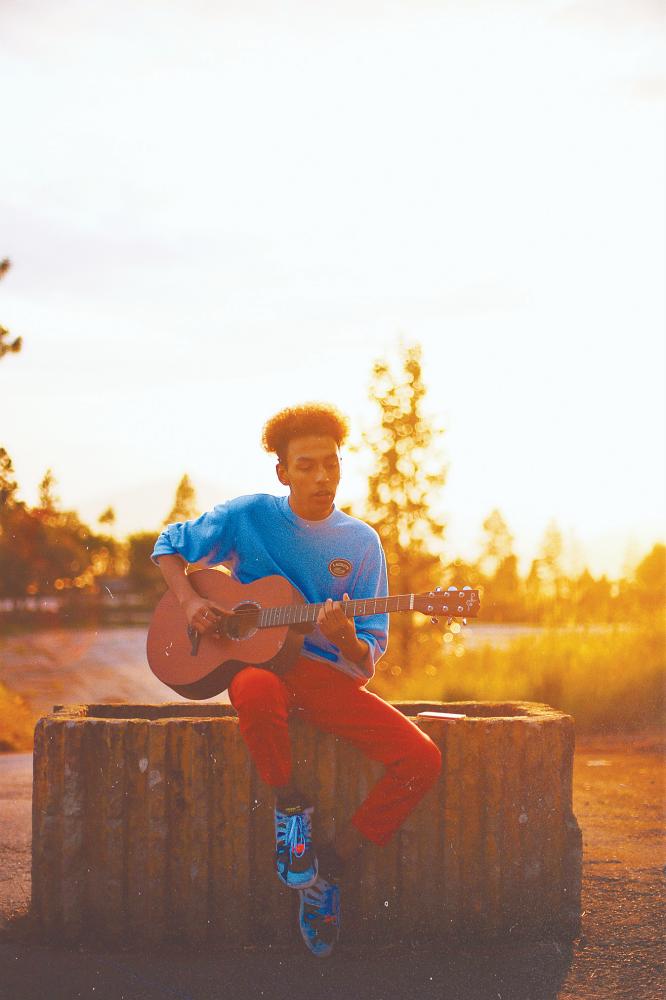WITH lyrics like: “You can be the one to bring me down but I will be just fine,” 16-year-old budding songwriter and producer Rufus Sivaroshan’s music blends upbeat electronic soundscapes, soulful blues and acoustic vocals with an understated melancholic charm.
His debut single Fine strikes a chord with most people, with relatable lyrics that flood our hearts with emotions and memories from our teenage years, and remind us that everything will indeed, be fine.
The self-taught guitarist started off performing in his bedroom, posting short covers of songs on his Instagram @heyimrufus, and later venturing out into performing gigs in front of large crowds.
Rufus then became the first Malaysian artiste to sign with British distribution company and record label AWAL, and even caught the attention of international musicians Wrabel, JP Saxe, and Sara Diamond.
He shares: “I just want to see people happy with my music and I hope that they would make something out of it.”
What is music to you?
“It is a form of universal expression. I’ve always had difficulties with speech ever since I was younger, I was never able to form perfect sentences correctly, especially when I’m under pressure, and it got really difficult on top of being bullied in high school.
“Music is this medium for me to express myself, without any barriers preventing me from saying what is on my mind, so it becomes really therapeutic in that sense.”
How did you find your genre?
“The story of how I found my ‘sound’ has been all over the place. When I started producing music, it was all EDM, with influences from Martin Garrix and Avicii, then it came to a point where I decided that I was pretty bad at it.
“As time progressed, I found myself listening to pop music, but not the typical kind you hear on most radio stations. I was listening to niche pop on Spotify and music from up-and-coming artistes.
“I slowly realised I was able to write and sing in the same [vein] ... it is something that I enjoy making.”
What is the story behind Fine?
“When I started writing it, I had just gotten out of a really toxic relationship, and at the same time just started my A-Levels, with a lot more things going on.
“I wrote Fine as a way to console myself that things will be alright, and that they’ll resolve [themselves] eventually.
“I wasn’t supposed to release Fine initially, but my friend Daniel who co-wrote the song with me really liked it, and said that it should totally be my debut. The song took me three months to complete, from drafting to perfecting it.
How did you manage to sign with AWAL?
“On the day I was about to submit the song to Spotify, I got an e-mail from AWAL saying that they really liked the demo I sent, and they would love to invite me onto their platform.
“One of the reasons why I was so stoked was that AWAL signed up so many artistes that I look up to, such as Lauv, Bruno Major, Rex Orange County, Verite, and [other] EDM artistes like Don Diablo and R3hab. It is just cool to be among that roster of artistes.”
Do you think it is hard to get noticed, when the music industry is so saturated right now?
“It is not difficult to build a fan base, because that can easily be done through word of mouth, but to break through as a professional is a little difficult.
“That being said, as long as you know what you’re doing, then it becomes a lot easier to go in the right direction and hopefully be where you want to be.
“Social media platforms are incredibly impressionable, and so easy for everyone to get around. We use Instagram to keep up with our favourite celebrities, so why not use that to learn about key people and have conversations with them.”
If you weren’t making music, what would you be doing?
“Honestly, I don’t think I will be doing music full-time, which is ironically weird because everyone in the creative industry is so passionate about what they do, and want to do it with all their hearts.
“I’m planning to study politics in university next year (not political politics but developmental politics).
“I like comparing [progress made by] less developed countries and developing countries to the progress [made by] developed nations, seeing how they have succeeded, and how can we [use] the same framework. I’ve always been intrigued by that.”













